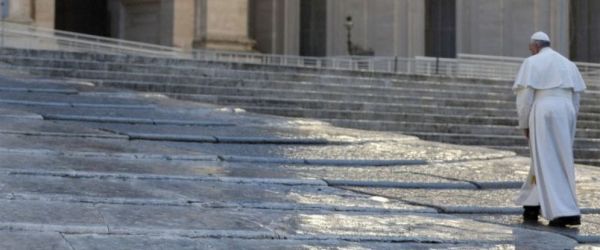The Gospel presents us the narrative of the miracle of the loaves (cf. Lk 9:11-17) which takes place on the shores of the Sea of Galilee. Jesus is intent on speaking to the thousands of people, performing healings. As evening falls, the disciples approach the Lord and say to him: “Send the crowd away, to go into the villages and country round about, to lodge and get provisions” (v. 12). The disciples too were tired. In fact, they were in a remote place, and the people had to walk and go into the villages in order to buy food. And Jesus sees this and responds: “You give them something to eat” (v. 13). These words astonish the disciples. They do not understand; perhaps they even become angry and they reply: “We have no more than five loaves and two fish — unless we are to go and buy food for all these people” (ibid).
Instead, Jesus invites his disciples to carry out a true conversion from the mind-set of ‘everyone for themselves’ to that of sharing, beginning with that little that Providence puts at our disposal. And he immediately demonstrates that he is quite clear about what he wants to do. He tells them: “Make them sit down in companies, about fifty each” (v. 14). Then, taking the five loaves and two fish in his hands, he addresses the heavenly Father and utters the prayer of blessing. Next, he begins to break the loaves, divide the fish and give them to the disciples, who distribute them to the crowd. And the food does not end until everyone has had their fill.
This miracle — a very important one, so much so that it is recounted by all the Evangelists — demonstrates the Messiah’s power and, at the same time, his compassion: Jesus has compassion for the people. Not only does that prodigious gesture endure as one of the great signs of Jesus’ public life, but it also foretells what will be, in the end, the memorial of his sacrifice, namely, the Eucharist, the sacrament of his Body and his Blood offered up for the salvation of the world.
The Eucharist is the culmination of Jesus’ entire life, which was a single act of love toward the Father and brothers and sisters. There too, as with the miracle of the multiplication of the loaves, Jesus took the bread in his hands, raised a prayer of blessing to the Father, broke the bread and gave it to his disciples; and he did the same with the cup of wine. But in that moment, on the eve of his Passion, with that gesture, he wished to leave the Testament of his new and eternal Covenant, a perpetual memorial of the Paschal Mystery of his death and resurrection. The feast of Corpus Christi invites us to renew each year the wonder and joy of this wondrous gift of the Lord which is the Eucharist. Let us receive it with gratitude, not in a passive, habitual way. We should not grow accustomed to the Eucharist and go to Communion as a habit: no! Each time we approach the altar to receive the Eucharist, we must truly renew our “amen” to the Body of Christ. When the priest says “the Body of Christ”, we say “amen”: but let it be an “amen” that comes from the heart, a committed one. It is Jesus; it is Jesus who saved me; it is Jesus who comes to give me the strength to live. It is Jesus, the living Jesus. But we must not become accustomed: each time as if it were the first Communion.
Processions with the Most Holy Sacrament, which are taking place throughout the Catholic Church during this Solemnity, are expressions of the eucharistic faith of the holy People of God.
[Pope Francis, Angelus, 23 June 2019]












